- Home
- Susanna Kearsley
The Shadowy Horses Page 2
The Shadowy Horses Read online
Page 2
My suspicions growing, I slowly turned to look at David Fortune, but his expression was charmingly innocent. So charming, in fact, that I scarcely noticed when the bus stopped moving. It wasn’t until I felt the sudden blast of chill from the open door that I finally stirred in my seat. Gathering up my suitcase, I tossed a word of thanks to the driver and clambered down the steps to solid ground.
The wind had grown colder. It struck me like a body blow and might have knocked me over if the man at my side hadn’t taken the suitcase from me, placing a large hand at my back to guide me up along the harbor’s edge. The tide was very high, and the fishing boats creaked at their moorings, masts and rigging swaying with the motion of the water.
If my mother saw me now she’d have a heart attack, I thought. She’d always had a thing about the seamy side of harbor life—a half-imagined paranoiac world of smugglers, cutthroats, pirates, and white-slavers. I took another look up at the great dark figure walking at my shoulder.
David Fortune did look a shade piratical, come to think of it, with his black unruly hair curling in the wind and the flat gray light of early evening sharpening the line of his stubborn jaw. His nose, in profile, was not quite straight, as though it had been broken in a fight. And I had only his word for it, after all, that he had anything to do with Peter Quinnell, or with Adrian Sutton-Clarke, or with…
“Here we are,” he told me, as a sprawling white pub rose at the next corner to welcome us. He had leaned down so that his voice would carry through the wind, and I caught the swift warmth of his cheek close by my face. Oh, well, I thought. Pirate or no, he was easy to look at, and I was, to be honest, in need of a drink and a plate of hot food.
There were two doorways into the Ship Hotel—one that led into the main public bar, and the other to the dining lounge. David Fortune steered me through the latter.
I felt instantly warmer, out of the wind, with the light bursting clear and inviting from rose-tinted fixtures hung high on the cream stuccoed walls. Round wooden tables hugged the wainscoting and nestled in padded alcoves that enticed one to sit and relax. Through an open door behind the bar I could just glimpse a larger, less fancified room where coarse cheerful voices competed with piped-in music, but on this side of the door even the bar held a touch of elegance, its gleaming rows of bottles artistically illumined by a line of recessed lights.
A few of the tables were already occupied. David Fortune plucked a menu from the bar and chose a table for us in a window alcove. Leaning back against the padded bench, he stretched his legs out so his feet disappeared under the bench on my side. “Take a look at that, then,” he offered, handing the menu over. “And order what you like; the bill’s on Quinnell. He’d not want to see you starve.”
The mention of Peter Quinnell’s name brought my earlier misgivings sharply into focus. “Listen,” I began, frowning slightly, “there isn’t anything wrong with the job, is there?”
He raised his eyebrows, but before he could respond the barmaid came through from the other side and sent us a welcoming smile. “Heyah, Davy. How’s your mum?”
“As much of a witch as she ever was.” His tone was indulgent. “Is Adrian about?”
“Upstairs, I think. Do you want me to fetch him?”
“Aye, if you would. But first, give us a…” He paused, looked at me, eyes enquiring. “What’ll you have?”
“Dry white wine, please.”
“And a pint of Deuchers for me, there’s a love.”
As the barmaid departed, I gave in to my curiosity. “Adrian’s upstairs?”
“Oh, aye. We both have rooms here. There’s just the one spare room at Rosehill, and Quinnell wanted to save that for you, so he’s put us both up here instead.”
Our drinks arrived. I watched him down a mouthful of the dark foaming beer, and frowned again. “Isn’t that rather inconvenient?”
He shook his head. “It’s only a mile out to the house. I like the walk.”
I tried to imagine Adrian Sutton-Clarke walking a country mile to work each morning, and failed. Adrian, I knew, would use his car.
A door from the corridor opened and closed and a tall, lean-faced man with mahogany hair shook his head and came, smiling, toward us. “Verity, my dear, you really must learn some respect for schedules,” he teased me, bending down to brush my cheek with an affectionate kiss of greeting. “Friday, last time I checked, comes after Thursday, and you did say Friday.”
“Hello, Adrian.” It always took me a moment to adjust to the sheer impact of his handsome face, even now. Each time I met up with him I kept hoping, rather foolishly, that he’d have chipped one of his teeth, or that his dark, long-lashed eyes would be puffy and bloodshot, but each time he turned up just as perfect as ever, a six-foot-two package of pure sex appeal, and invariably knocked me off center. Only for a moment, and then memory reasserted itself and I was fine.
David Fortune had misinterpreted the involuntary change in my expression. He drained his pint and rose politely. “Look, I’ll leave you to it, shall I? I could do with a shower and a lie-down, myself. See you both tomorrow.” Slanting a brief look down at me, he stabbed the menu with a knowing finger. “Try the lemon sole, it’s magic.”
Adrian slid into the vacant seat opposite and favored me with a curious stare. “Just how,” he asked me, when we were alone, “did you come to meet Fortune? Or do I want to know?”
“We were on the same bus. We got talking.”
“Ah.” He nodded. “The bus from Berwick.”
“Dunbar, actually.”
The waitress came. I closed my menu, and ordered the lemon sole.
Adrian leaned back, contentedly. “I know I’m going to regret asking this,” he said. “But how, if you came up from London, presumably on the train, did you end up on a Berwickshire bus from Dunbar?”
I explained. It took some time, and I was nearly finished with my meal by the time I’d told him everything, beginning with the sheep on the line at Darlington. Adrian shook his head in disbelief and reached for his cup of coffee. “You see? If you’d waited until tomorrow, like you were supposed to, none of that would have happened.”
I shrugged. “Something worse might have happened. You never know.”
“True. Confusion does rather seem to follow you around, doesn’t it?”
“So tell me,” I changed the subject, balancing my knife and fork on my empty plate, “what exactly is this job you’ve recommended me for?”
Adrian folded his arms and smiled like the devil. “As I recall, I told you I’d explain everything on Friday.”
“When I arrived, you said.”
“On Friday. And today’s only Thursday.”
“Oh, give it up…”
“But I’m sure Quinnell will be happy to tell you anything you want to know, when you meet him.”
“That’s hardly fair,” I pointed out. “I’m meeting him tonight.”
“So you are. Finished with that, have you? Good. Then let’s get you out to Rosehill so you can settle in.”
“Rat,” I called him, holding back my smile.
Ten minutes later, seated in his car and speeding inland from the harbor, I tried again. “The least you can do,” I said evenly, “is tell me what’s wrong with the job.”
“Wrong with the job?” He flashed me a quick sideways glance, eyebrows raised. “Nothing’s wrong with the job. It’s a great opportunity, wonderful benefits—Quinnell’s a disgustingly wealthy man, so the pay is obscene. And you get room and board with it, holidays, travel allowances… it’s a marvelous job.”
“You’re certain of that?”
“Lord, yes. You don’t think I’d have lured you up here otherwise, do you?” Again the rapid glance. “Why the sudden lack of trust?”
I shrugged. “Just something your Mr. Fortune said, in passing.”
“Oh, yes?”
“He was sure that I’d be offered the job,” I explained. “He wasn’t so sure I’d accept.”
Adrian digested this thoughtfully. We were well out of town, now, and the road was dark. I couldn’t see his eyes. “I suppose,” he said slowly, “that he might have been thinking of Quinnell himself. Of how you’d react.”
“React to what?”
“To Quinnell.”
I sighed, tight-lipped. “Adrian…”
“Peter Quinnell,” he told me, “is a fascinating old character—well-read, intelligent, one of a kind.” He turned his head so I could see the half-apologetic smile. “But I’m afraid that he’s also quite mad.”
Chapter 2
“I beg your pardon?”
“Darling, you can look positively Victorian at times,” was Adrian’s response. He was grinning. “Those eyes… and anyhow, it isn’t what you think. He’s not the murderous sort of madman, nor even the creeping-round-the-back-stairs sort.”
I lowered my eyebrows, cautiously. “What sort is he?”
“You’ll be able to judge for yourself, in a minute. That’s Rosehill up ahead.”
I looked, but saw only a tiny, low-slung cottage set practically at the road’s edge, its windows blazing warmth and light. “What, that?”
“No. That,” he said, with a tutor’s patience, “is the groundskeeper’s cottage. The drive runs up from there, do you see? It runs right up the hill to that big house, there in the trees…”
“Rosehill,” I guessed.
“Correct.”
It didn’t look a house at all, to begin with—just a looming block of darkness screened by darker, twisted trees, but then the wind blew and the branches shifted and I saw a twinkling gleam of yellow light. It wasn’t as welcoming as the light coming from the cozy little cottage at the foot of the drive. There’d be a family in that cottage, I thought, as Adrian turned the car in and we swept on past the beaming windows. A young family, perhaps, all cuddled round the telly.
But the light from Rosehill wasn’t like that. It spoke to me of work, of intellect, of solitude—a student’s candle burning in a lonely garret. It didn’t want us there, that light. It wanted privacy.
The strange impression was made stronger by the simple fact that, though the house was huge, a great square fortress of a place, only the one ground-floor window was showing light. I frowned. “It looks as if he’s gone to bed.”
“At nine o’clock? Not likely. No, I’d be willing to bet that since it’s Thursday—the cook’s night off—our Fabia’s gone out somewhere, to have supper, while the old man makes do with egg and chips in his study.”
“Fabia?”
“Quinnell’s granddaughter. Quite a fetching young thing. Blonde. At least,” he amended, “Quinnell says she’s his granddaughter.” He saw my face and grinned again, urging the car up the final gasping bit of drive. “Don’t worry, darling, the old boy’s as harmless as I am.”
“Ah.”
“And don’t go saying ‘ah’ in that superior little tone.” He killed the engine, shifting round to face me. “Really, Verity, your lack of trust in me is quite appalling. Whatever did I do to deserve this?”
It was my turn to smile. “You want a list?”
“Ooh,” he inhaled, feigning pain, “a fatal blow. My ego doesn’t stand a chance when you’re around, does it? Still,” he conceded, leaning over to reach across me and unlatch my door, testing the physical power of his close contact with my body, “I am glad we’re going to be working together again. We did make a wonderful team.” The dashing smile came close to my own mouth, in the near-darkness. Three years ago I might have fallen for it; now I was quite blissfully immune.
“Yes, well,” I said, “I haven’t got the job yet.” I pushed open my door and the cold night air swirled in around us both, breaking the intimate mood. He laughed and made some comment that I didn’t catch because the wind stole it, and then I heard the slam of the driver’s door as he came round to join me on the level sweep of ground approaching Rosehill House.
I was grateful that I didn’t stumble as I walked toward the great solid shadow looming just ahead. Without the benefit of light, I couldn’t see the house in any detail. I had to rely on Adrian to lead me up a sideways flight of stone steps to the front door. At least, I presumed it was the front door, because he knocked on it, and after what seemed an age I heard the bolt slide back and watched the door swing heavily inwards. An elegant curse, a sharp click, and the hallway beyond exploded into brilliant light.
It was fitting, I suppose, that in the instant I first saw Peter Quinnell my eyes were dazzled.
I tried desperately to focus in the sudden blinding glare, while spots flashed crazily across my vision and the tall black figure at the door leaned in closer still, and spoke. An English voice—a smooth poetic voice that made me think of West End theaters, of words that floated upwards from a semi-darkened stage and built an image with their melody alone.
“What… Adrian, my boy,” the voice said, in delighted tones. “Do come in. The wind is foul tonight, you’ll both be blown away if you’re not careful. Please.” The figure stepped aside, in invitation. “And dare I hope that this lovely young woman is who I think she is?”
“Verity Grey,” confirmed Adrian, as we moved from darkness into light and shut the door upon the violent wind.
Visible at last, my host reached down to take my hand, and smiled. “I am so very glad to meet you, my dear. I’m Peter Quinnell.”
My first thought, on the step outside, had been that I’d been misinformed, somehow—that Peter Quinnell wasn’t old at all. He fairly towered over me, loose-limbed and lean, not stooping, and the voice and movements were those of a much younger man than the one I’d expected. Only now, standing in the clearer light of the vestibule, could I see the weary lines the world had carved into the long, still-handsome face; the whitened hair that might once have been gold; the evidence of age upon the beautifully formed hand clasping mine. His eyes, too, were the eyes of a man who had lived for many years. They were long, like the rest of him, and languid, and the lids drooped as though the effort of holding them open was too much for him.
I wasn’t fooled. Behind the languor burnt an intellect that could not be disguised, and though his eyes moved slowly they were sharp. They wouldn’t miss much, eyes like that.
I smiled back. “How do you do?”
“I was about to ask you the same question,” Quinnell said. “You must be rather tired, if you’ve come up today from London. We actually weren’t expecting you until tomorrow.”
I flushed a little. “I know. Sorry. I just… well, the truth is I’m not very good at waiting. I’ve been packed and ready to come since Monday, and when I woke up this morning it felt like such a good day for traveling…” I stopped, aware that I was rambling on. “I thought, you see, that I’d be staying at a B and B, or something…”
“What?” His look of horror was quite genuine. “Oh, my dear girl, that would never do. No, no, we have a room all ready for you, and my granddaughter’s been fussing over it for days, buying curtains to match the coverlet, and that sort of thing. You’d not want to disappoint her, surely? Besides,” he added, “I was rather hoping to hold you captive here until I’d managed to persuade you to join our motley little team.” The hooded eyes touched mine, with stunning charm, and he smiled again. “You have your luggage with you?”
“Just one bag. It’s in the car.”
“Good.” Still charming, the smile slid to Adrian. “Fetch it for her, will you? There’s a good chap. You can put it in the guest room at the head of the stairs—you know the one? Then come and join us for a drink in the sitting room.”
Adrian hadn’t planned on staying—I could tell as much from the tiny frown that creased his forehead for the span of a single
heartbeat. He had simply meant to deliver me, and make the necessary introductions, and then get back to whatever it was he’d been doing when I’d interrupted him. Chivalry, I thought drily, was a word that Adrian Sutton-Clarke had never learned to spell. He’d been the same when we were dating, always vanishing from parties when it suited him, and leaving me to find my own way home.
He hesitated, looked at Quinnell, looked at me, and turned away obediently. “Right. Won’t be a moment.”
When the front door had opened and closed again, Peter Quinnell drew back a pace to study me with interest. I pretended not to notice the appraisal, letting my own eyes wander round the little vestibule in which we stood. There was nothing in it, really, save a few pairs of tumbled boots and shoes and a leaning stack of empty flowerpots. I gathered that the proper entrance hall lay somewhere in the dark behind my host, beyond the French doors flanked by matching window panels that reflected my own image back to me. My reflection, thankfully, didn’t look the least bit nervous.
Peter Quinnell finished his inspection and tipped his head to one side. “I must say, I am surprised. You don’t look anything like I expected.”
I smiled. “That’s just what Mr. Fortune said. I met him on the bus,” I explained, as Quinnell raised an enquiring eyebrow. “I gather everyone thought I’d be tall and blonde, and more… well, more…”
“Quite. Our Mr. Sutton-Clarke does have a certain reputation,” he agreed. “And he did say, my dear, that he knew you rather well, so naturally one builds a certain image in one’s mind…” He smiled, and shrugged.
“Sorry to disappoint.”
“Good heavens, I’m not at all disappointed. And no more, I suspect, was David Fortune. You met him on the bus, you say? Out visiting his mother, was he?”
I admitted I had no idea where he’d been. “Is he a local man, then?”
“David? Oh yes. Eyemouth born and bred, is David. He hasn’t lived here for some years, mind, but his mother has a cottage on the coast, north of St. Abbs.” He turned away to pull the French doors open, letting the light creep uncertainly into the large front hall beyond. “Please, do come through. I’ll put the light on… there.” A switch clicked somewhere and a warm lamp glowed as if by magic from atop a Spanish chest; glowed again within the mirror hung behind it, and in all the frames of all the prints and sketches grouped around the great square entrance hall.

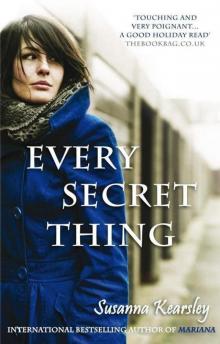 Every Secret Thing
Every Secret Thing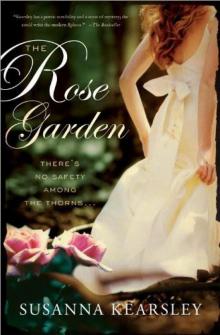 The Rose Garden
The Rose Garden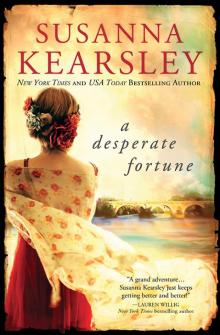 A Desperate Fortune
A Desperate Fortune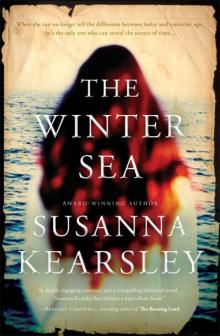 The Winter Sea
The Winter Sea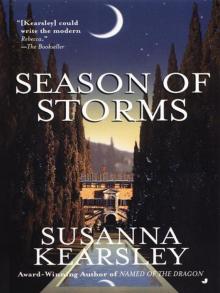 Season of Storms
Season of Storms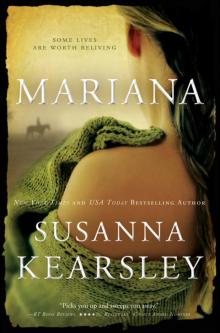 Mariana
Mariana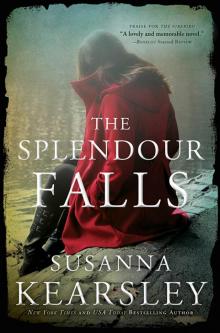 The Splendour Falls
The Splendour Falls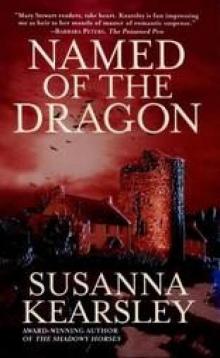 Named of the Dragon
Named of the Dragon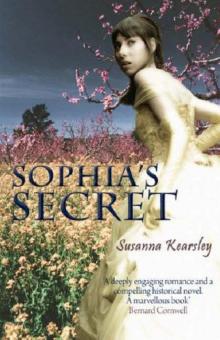 Sophia's Secret
Sophia's Secret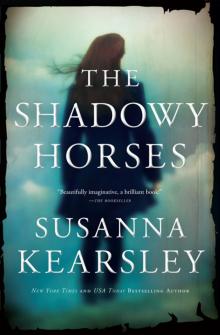 The Shadowy Horses
The Shadowy Horses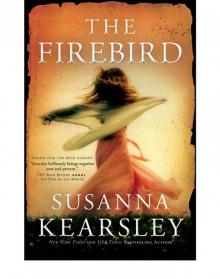 The Firebird
The Firebird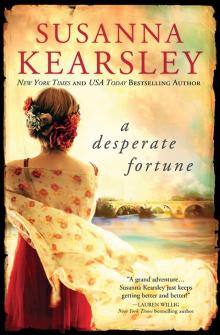 Desperate Fortune
Desperate Fortune